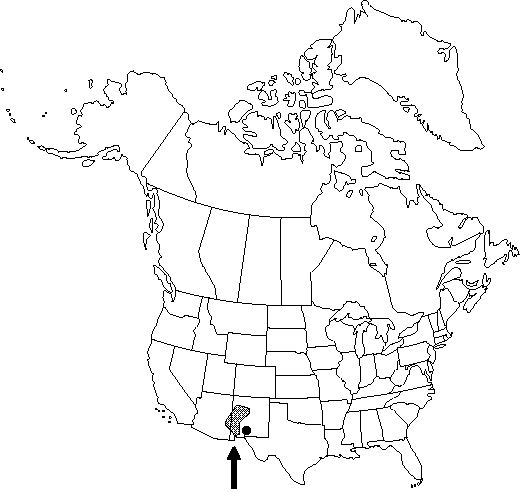Clematis bigelovii
Pacif. Railr. Rep. 4(5): 61. 1857 ["1856"].
Stems erect or sprawling, 0.1-0.6 m, short pubescent-pilose, sometimes sparsely so. Leaf blade 1-2(-3)-pinnate; primary leaflets 7-11, mostly deeply 2-several-lobed, leaflets and larger lobes mostly ovate, 0.8-3.5 × 0.5-1.5 cm (lateral lobes nearly as wide as central portion), thin, not prominently reticulate; surfaces glabrous, somewhat glaucous. Inflorescences terminal, 1-flowered. Flowers broadly urn- to bell-shaped; sepals purple, lanceolate, 1.5-3 cm, margins narrowly expanded distally to ca. 1 mm wide, thin, crispate, tomentose, tips acuminate, spreading, abaxially sparsely pubescent. Achenes: bodies appressed-long-pubescent; beak 2-3 cm, glabrous or inconspicuously appressed-pubescent, sparsely so toward tip.
Phenology: Flowering spring–fall.
Habitat: Mountain slopes, moist sites in canyons
Elevation: 1700-2400 m
Discussion
Clematis bigelovii is locally common and is restricted to New Mexico and a few sites in Arizona. Although usually grouped with C. hirsutissima because of its scarcely viny habit, this species appears to represent the extreme expression of clinal variation including C. pitcheri var. dictyota and, at the other extreme, eastern populations of C. pitcheri var. pitcheri; it might well be treated as C. pitcheri var. bigelovii (Torrey) B.L. Robinson.
Clematis palmeri Rose is represented by a small number of specimens from New Mexico and one from eastern Arizona, and its distinctness as a species has been questioned. The few published descriptions scarcely suffice to indicate its distinguishing features and are sometimes at variance with each other and with specimens so identified by R.O. Erickson (1943) or others. Almost all specimens were found where C. bigelovii was reported nearby. Pending further studies, it seems likely that C. palmeri comprises somewhat aberrant specimens of C. bigelovii, C. hirsutissima var. scottii, and/or C. pitcheri var. dictyota, perhaps also some herbarium sheets of flowering and fruiting material inadvertently collected from different species, and/or hybrids involving the species named above in one or more combinations.
Selected References
None.
